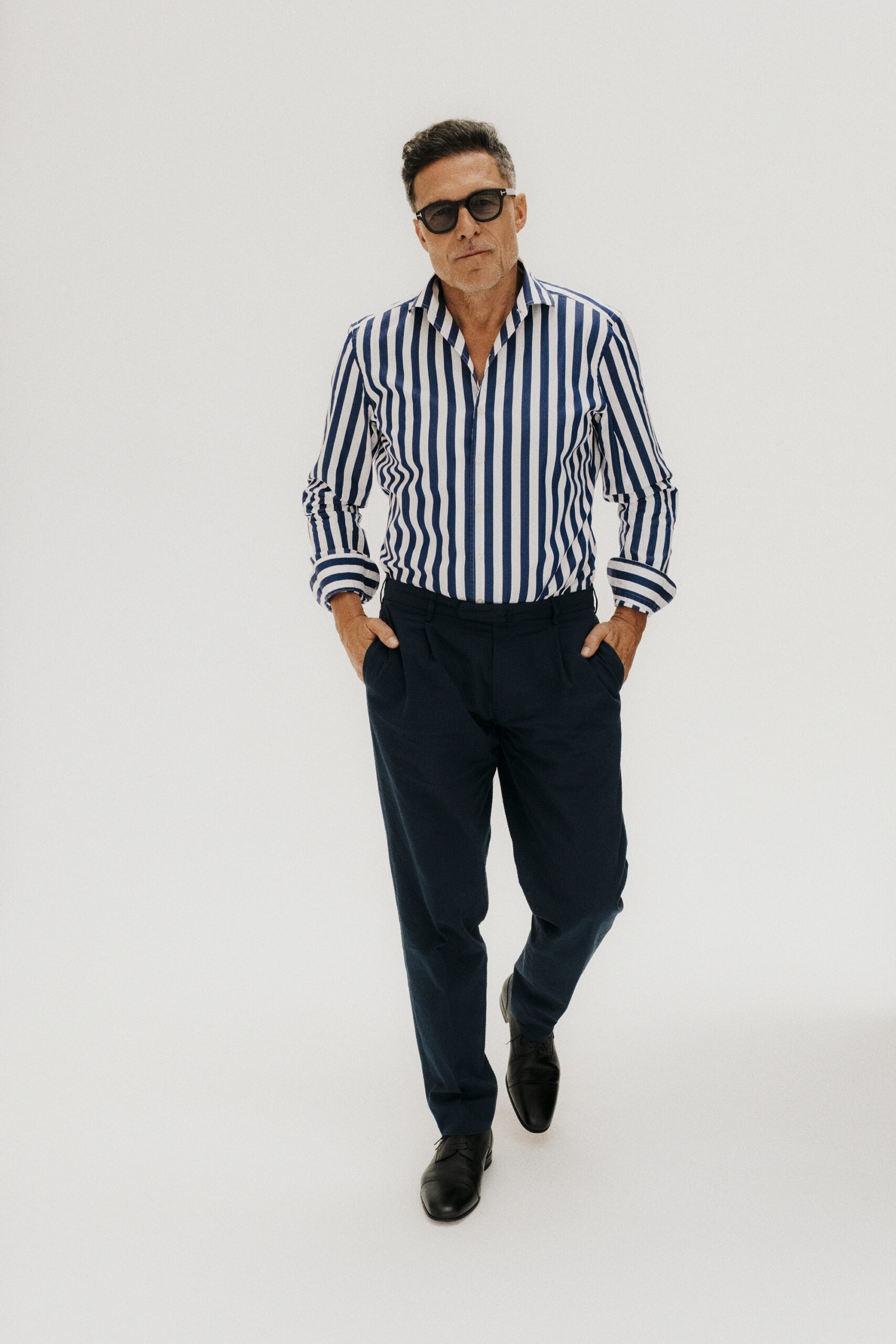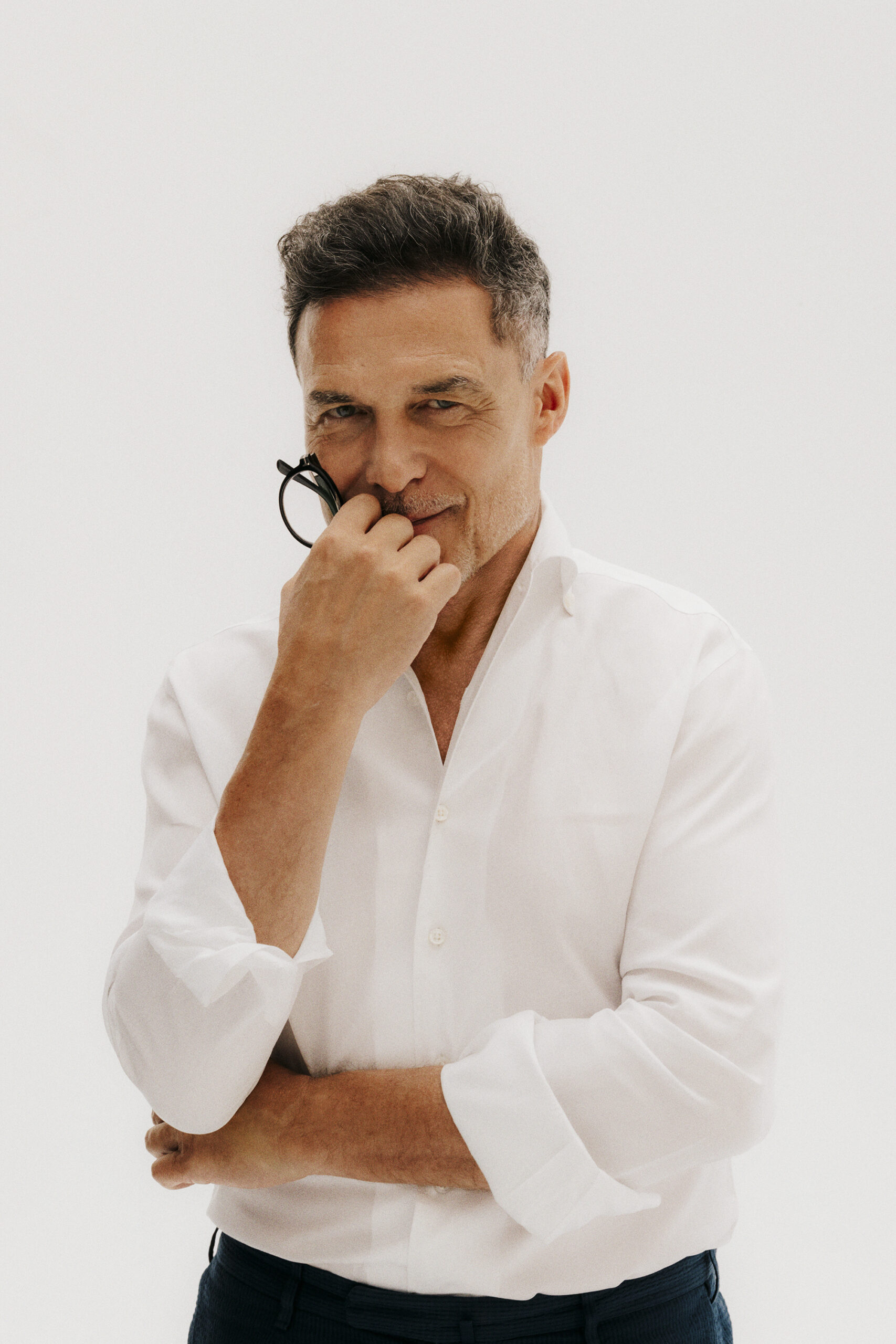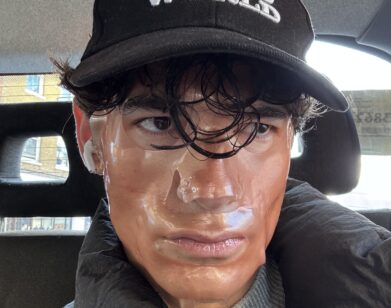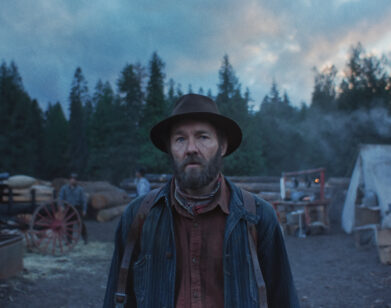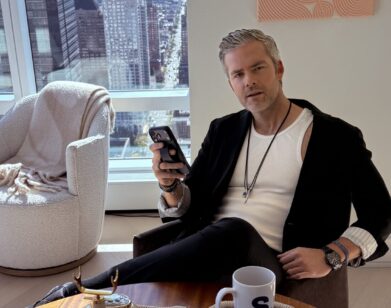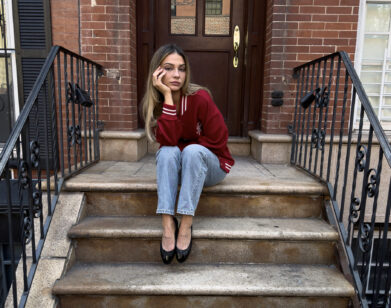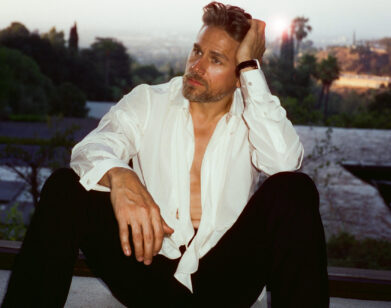ROOM SERVICE
As the Chateau Turns 100, André Balazs Won’t Be Naming Names
The other night at the Chateau, Mitch Glazer told me a quintessential André Balazs story. During the SAG-AFTRA and WGA strikes in 2023, a down-and-out fifty something actor pal of his asked for help in getting waitstaff work. Mitch reached out to a dozen restaurateur friends; each said business was in an awful slump, try us in a few months, blah. André hired the man sight unseen. He told Mitch, “I always find openings for exactly this thing,” meaning not just for casual acts of compassion but to loyally honor an old friend’s request. That anecdote is a grain of colored sand in the mandala of the Chateau Marmont —André Balazs’ immoveable feast, his sanctuary, an impresario’s permanently impermanent design for living. The mythic hotel’s centenary comes next year, which is a helluva run for a sand mandala. The modest tale won’t find its way into The Chateau, the eight-part series Mitch and I are writing for Netflix, though so many other fables, twice —and never— told will. I sat down with André for a colloquy about the dream castle that’s embossed on the collective consciousness of Hollywood.
———
TUESDAY 6:30 PM JUNE 10, 2025 LONDON
BRUCE WAGNER: It’s good to see you! I should first say that all the questions I have are AI-generated. I think your responses should be AI-generated as well.
ANDRÉ BALAZS: We tend to have a problem finding things to talk about anyway.
WAGNER: We’ve known each other for, like, 35 years?
BALAZS: I think you gave me my first proper tour of Los Angeles, when you were a chauffeur. You drove James Truman, Sofia Coppola, and me around the hills of Hollywood, explaining how they were going to burn down.
WAGNER: Really? Oh man. It’s perfect because this interview is really to promote my new book, which is about the fires. The absurdity of the Chateau, though, is that it’s entered the consciousness not just of Hollywood but of the world. When you think of the Chateau, is it like a person? Is it almost something in your blood that’s equivalent to a child?
BALAZS: I do think of hotels as people and personalities, and that’s how people relate to it. Every-one seems to have a highly personalized relation-ship with the place. And there are common themes, as you find in people who are all friends with the same person. But the individual relationships are unique. Like yours. I remember when you were doing Wild Palms [the 1993 mini-series created by Wagner], you wanted to stay at the Chateau to have a place to write. Suddenly, you had an office there.
WAGNER: It’s a common brag in L.A. that someone says they’re the person who’s stayed the longest at the Chateau. I’ve actually been there the past few nights, not for this interview, but because I adore it. I was there with Bret [Easton] Ellis and Sam Wasson. At the next table there was Sacha Baron Cohen, Chris Rock, Leo, Michael Mann, Pacino. It’s absurd. When did you first discover the Chateau?
BALAZS: I discovered it because I started investing in restaurants and nightclubs. We had a night-club on Sunset Boulevard that got so much publicity before it opened that we didn’t get a liquor license. I went to L.A. to try to salvage it and I stayed at the Chateau. This was 37 years ago.
WAGNER: Geez.
BALAZS: When I bought it 35 years ago, the owners were going to tear it down. But staying there, I fell in love with it. It was just a vibe. Of course, it wasn’t at all what it is like now. A book we did 30 years ago was reissued by Rizzoli. Jay McInerney wrote a piece in it, and he describes his experience with the Chateau, and the hallways with duct tape on the carpet. It was a different place.
WAGNER: It’s your longest marriage. It’s many of our longest marriages. In that sense there’s something feminine about the Chateau. It’s like the Great Mother. Speaking of the Great Mother, I’ve always been intrigued when you’ve spoken of your parents. They lived into their mid-nineties, did they not? And your mother was a therapist.
BALAZS: And a piano player. My father was a doctor, but really a scientist.
WAGNER: I see you as a kind of split personality, in essence.
BALAZS: Who isn’t?
WAGNER: Your presentation is one of utter charm and literacy, but I’ve seen another part of you that is also charming, but with savage anarchy. I’ve seen parts of you that are messy and black humored and the other parts that are obsessive and meticulous in terms of art and style. The gar-ments of the hotel are high couture. But that grungy hotel and the beauty of the building itself and its dreamlike location are also part of the package. It really is a castle that gives the appearance of being in Bavaria, and yet it’s in the nexus and soul of what used to be show business. How much of honoring that was a challenge to the artist part of André Balazs?
BALAZS: I always wanted to be a writer, but I couldn’t write. I liked storytelling. I also wanted to be a sculptor because I liked the three-dimensional. The creation of a place or thing speaks tome more than a two-dimensional photograph or a painting. That led to a fascination with architecture, because it brings both of those together. Working with something like the Chateau and the whole hospitality world the way I have approached it is very much about creating a physical stage, or a platform for life. Then the writer part of me wants to bring life onto the platform. It’s about encouraging people to play the roles. But at the core, I believe in encouraging an atmosphere that’s nonjudgmental, because it brings out the best in people. We’ve been working on a lot of research in anticipation of the Chateau’s centennial in 2027. We’re doing another book for it, and the theme that comes out of all this research is the incredible interweaving of very creative lives. The number of books, films, scripts, and mu-sic written at the Chateau, triggered by it, and inspired by the interaction of its denizens, is re-markable. That is the essence of a community.
WAGNER: Who did you buy the Chateau from?
BALAZS: They were two Armenian partners. They’d owned it for about 10 years. They were fighting, and so I bought one of them out, and then I bought the other one out. That’s how it started.
WAGNER: One thing that characterizes you is your largesse, particularly toward artists. I’ve been a recipient of it. I know so many writers and artists whom you have helped when they were either in arrears, displaced, or evicted. I heard a story about Keanu Reeves, who stayed at the Chateau during the pandemic, and then sent handwritten notes to the staff, thanking them for how they had treated him. That feeling emanates from you.
BALAZS: That’s very sweet. I’d like to think that, but it takes a village. It’s a remarkable group of people at the Chateau. Obviously I can’t name any names, but that story has made the rounds.
WAGNER: I remember going out to dinner with you, Uma Thurman, and Helmut Newton and his wife. I told my favorite joke, which is that I want to die in my sleep like my father did, and not like the three other people in the car. The very next day, Helmut crashes his car in front of the Chateau and dies. Another time, I had just gotten out of rehab and you and I were having dinner with Chelsea Handler. At a certain point she looked at me and said, “You’re a hot mess, aren’t you?” My point is, you’re a bearer of so many secrets. You’re a gregarious person. If you didn’t have the passion for people, it would be impossible to do what you do. How, André, do you deal with crises and secrets? I’m not asking you to reveal them, but do guests come to you as a consigliere or a therapist?
BALAZS: Bruce, you should be a therapist. I happen to deal very well with crises. Too well. Sometimes I create a crisis just so I can deal with it well. [Laughs] I think dealing with confidences is also something I do very well. It feels like you’re helping people. I suppose there’s an element of therapy in there. You don’t betray anybody. You’re there for them to the best of your ability. You try to provide solace and stability and a certain perspective.
WAGNER: Try as I have, I’ve never managed to pry any substantive gossip from you.
BALAZS: I’m sorry about that. [Laughs] It’s a shitty interview. You can just make some up. I’ll go along with that.
WAGNER: Speaking of crises, it was around the time that we were having the fires here in L.A. that Chiltern Firehouse in London burned. How did you acquire and build Chiltern Firehouse?
BALAZS: First, with the fires: I was in Los Angeles. It was January. We had to evacuate the Chateau when the Runyon Canyon fires came up. I didn’t want to go. I was the last person out, and then I left for 30 minutes to placate my two daughters who were freaking out that I was there. Ten days later I go to London and, on a rainy afternoon, a wood-burning thing falls out of the pizza oven, and the whole place burns down. Ironically it’s a firehouse. It was London’s first purpose-built fire-house. As a result, there were like 120 firefighters on the scene. Some of them came, according to the fire chief, for nostalgic reasons. The idea of put-ting out a fire in a firehouse had a certain allure to it. So it is a very, very strange thing. So it’s now a two-and-a-half-year rebuild because it was completely ruined.
WAGNER: Was it 10 years ago that you opened it?
BALAZS: We celebrated the 10th anniversary in November, and then on Valentine’s Day in 2025 it burned down. So it’s kind of a perfect bookend. It’s funny because we’ve done, like, 28 hotels, from St. Barts to Miami to Comporta in Portugal. But it’s the Chiltern Firehouse, which is a very small hotel, that’s the perfect sister to the Chateau. I use the feminine because there is something warm about a good hotel, which I associate with a feminine quality.
WAGNER: Did you work for Warhol at a certain point in your life?
BALAZS: No, I didn’t. He had a tendency to pick people up and he would become fascinated with you. When Paige Powell was with him all the time, in the last four or five years of his life, I would see him maybe three times a week as his date to dinner stuff. But I never worked for him. I just admired him a lot.
WAGNER: You went to dinner with him?
BALAZS: Occasionally I took him to fun places like West Point to see the Army-Navy football game, things like that. But it was mostly just dinner.
WAGNER: You were in your twenties?
BALAZS: Yeah. There’s one moment that I think I can tell. We had dinner at the Odeon. I was there with my lawyer, who looked every bit a lawyer. And Jean-Michel Basquiat came with his father, who looked exactly like the accountant he was. So we were having dinner, then Keith Haring was having a party at the Garage or something. We went and we couldn’t get in because people didn’t recognize Andy. It’s hard to imagine. And Jean-Michel wasn’t well-known enough at that point. So they had to send the bouncer up to get Keith to come down and let us in. Life is the ebbs and flows.
WAGNER: You said that you always wanted to be a writer after college. Did you have any idea of where you were going or what you would be doing? Later you got into business with your dad, right?
BALAZS: I worked in politics for a guy called David Garth, who was like the James Carville of Democratic politics, running campaigns. I worked as a press secretary for Bess Myerson, who was running for U.S. Senate. Then I thought I’d start a business with my father, who had spent his career doing academic research on hyaluronic acid, which is a molecule that’s in the intercellular matrix of the body. It’s now in virtually every cosmetic and medical product from eye surgery to synovial fluid replacement. Anyway, we started a biotech company, and I did that for 18 years. But I wanted no distinction between my personal life and my business life, because I like people. Doing what I’m doing now effectively blurred everything. I can’t tell whether I’m with friends or with business associates —it’s all one big mess, and that’s great.
WAGNER: What was your relationship like with your mom?
BALAZS: Very close. She was a very creative contrarian. She absolutely hated authority. She grew up in a part of Czechoslovakia that had been Hungary before the First World War, and then it was annexed. Her father was a doctor and, well, you’d call him a terrorist or a revolutionary these days. Yugoslavia was created partially out of fragments of Hungary. So she ended up there. I think there was an aspect of her personality that was just completely against any authority.
WAGNER: It’s foreign to me to have parents that one admires and respects. This was not my experience. I was close to my mother, but I had an absentee father who was a cruel man. To this day, when I meet people who have strong relationships with their parents, it always strikes me as a small miracle. I was reading about where your father passed. It was Saint-Tropez, and I thought, of course it was. The glamour of Balazs. Do you think you will ever write something? Not a memoir, but a novella or something like that?
BALAZS: I’d like to think I would, but I don’t know. I would have to probably release it under some pseudonym. I wouldn’t want to take responsibility for it.
WAGNER: Listen, I will help you in any way I can for just a six-month stay at the Chateau.
BALAZS: That sounds like a deal, baby. [Laughs]
WAGNER: With an option to renew.
BALAZS: A sequel.
WAGNER: Do you have any kind of spiritual practice?
BALAZS: No, I wish. I worship at the altar of creativity. I don’t believe in any organized religion. I’d say I’m agnostic, not atheist.
WAGNER: It’s the disorganized religion of passion and creativity and love.
BALAZS: Love is definitely not organized. Not in my life. [Laughs] I will say, I really believe intolerance.
WAGNER: The most salient characteristic that I see in you. And forgive me, reader, if this is too sappy. But the thing about you, apart from the largesse, is that when you wake up each morning there is an excitation about the mystery of the day, and those who populate your life are players in that mystery.
BALAZS: I would agree. It is very, very exciting. For example, just to use the lobby of the Chateau as a placeholder for someone’s psyche, the characters that pass through, your description earlier of who’s sitting at what table —that’s just part of it. If you make that into a 24-hour saga or journey, to me, that’s what the magic is. It’s the interaction of remarkable people. Everyone gets triggered by other remarkable people. Forget celebrities liking celebrities. It’s not that. Interesting, creative people just can’t stay away from other interesting, creative people.
WAGNER: While we were having dinner last night, David Unger held his phone up and it’s Courtney Love. She’s on her way down and she sends this long, brilliant poem about Pico Boulevard. Where else in L.A. could this shit happen but at the Chateau?
BALAZS: Where else in the world could this shit happen?
WAGNER: I would be deeply depressed if I knew I was going to be on the planet for another quarter of a century. What about you?
BALAZS: Oh, man. I hope I am. If I knew with confidence that I had a good 25 years left, I think I would step up the pace a bit.
WAGNER: What would you do?
BALAZS: More of everything, and do it a little better.
WAGNER: Do you feel that you are still in an acquisitive time of your life where you might consider another property?
BALAZS: Yeah, but it’s not acquisitive, it’s inquisitive. I had a very, very peculiar reaction to this fire once I knew no one was hurt, because it happened at 3:00 in the afternoon, and by 4:30 it was very clear what was going on. Eight hours later it really ignited and burned from there. There was a very strange sense of a bookend —a chapter in your life. And the fact that it happened to be 35 years after the Chateau was born. It’s a very weird bookend, but I found it very uplifting. It gave me a sense of freedom, that there was a chapter that was behind and there would be an opportunity to do a new chapter, whatever that was. I was standing outside. It was a very cold evening. And I was out there for, like, 10 hours talking with the fire department. At one point Claire Darrow, my business partner, came up to me. I was standing in a doorway of a shop across the street. She said, “André, what’s wrong with you?” I said, “What do you mean?” She said, “You’ve got to stop smiling so much. This is not a good thing.” But weirdly it felt like a good thing. Not the damage. Thank god no one was hurt. But it felt like an end of something and a beginning of something else.
WAGNER: It’s very you. After the initial horror, your default is to make something out of the ashes.
BALAZS: I’d like to think that one can do that.
———
Grooming Balazs: Sky Cripps-Jackson at The Wall Group.


